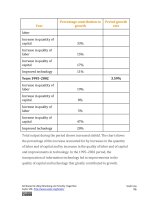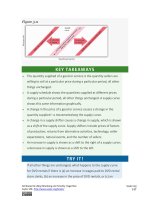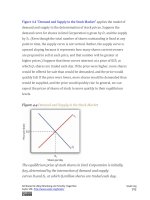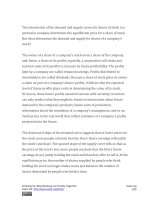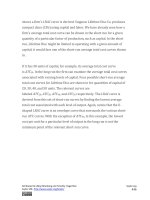Authors libby rittenberg 804
Bạn đang xem bản rút gọn của tài liệu. Xem và tải ngay bản đầy đủ của tài liệu tại đây (522.58 KB, 1 trang )
These potential market responses are the sort of thing one would expect
from rising fuel prices. Ultimately, it is difficult to see why gasoline prices
should be a matter for public sector intervention. But, the public sector
consists of people, and when those people become angry, the urge for
intervention can become unstoppable.
Sources: Paul Davidson and Chris Woodyard, “Proposals To Cut Gas Prices
Scrutinized,” USA Today, May 11, 2006, p. 5B; Joseph Curl, “Bush Orders
Suspension Of Gas Rules; Federal Probe To Look At Price-Gouging
Charges,” The Washington Times, April 26, 2007, p. A1; David M.
Herszenhorn, “As Gasoline Prices Soar, Politicians Fall Back on Familiar
Solutions,”The New York Times, May 3, 2008, p. A16; Richard Simon, “The
Nation; Mixing Oil and Politics; Congress Votes To Stop Shipments to the
Nation’s Reserve. The Move Could Save Motorists Some Money,” Los
Angeles Times, May 14, 2008, p. A18.
ANSWERS TO TRY IT! PROBLEMS
1. This is an attempt to deal with monopoly, so it is a response to
imperfect competition.
2. Cigarettes are treated as a demerit good.
3. Protecting the earth from such a calamity is an example of a public
good.
4. Food Stamps are a means-tested program to redistribute income.
5. Social Security is an example of a non-means-tested income
redistribution program.
6. This is a response to external costs.
7. This is a response to monopoly, so it falls under the imperfect
competition heading.
Attributed to Libby Rittenberg and Timothy Tregarthen
Saylor URL: />
Saylor.org
804
